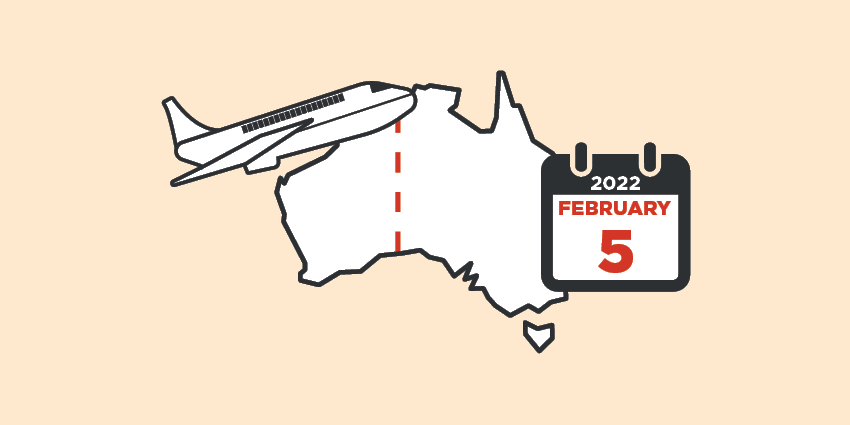
Visit the What you can and can’t do page for the latest advice and information on current measures in Western Australia. In light of the Omicron variant, work continues to finalise all settings as part of WA’s Safe Transition Plan.
Western Australia will embark on its Safe Transition Plan as announced last month, to safely ease its hard border controls in line with a 90 per cent vaccination rate, from 12:01am on Saturday 5 February, 2022.
The locked-in transition date is based on the latest projections for when WA is at its target rate of 90 per cent double dose vaccination for eligible Western Australians aged 12 years and above.
Travel and testing requirements
To safely enable quarantine-free travel into the State, new testing requirements for arrivals will be introduced to assist with the safe transition of COVID-19 in the WA community.
Double dose vaccinated international arrivals will be required to:
- return a negative PCR test result within 72 hours prior to departure; and
- return a negative PCR test within 48 hours of arrival to WA and on day six.
While double dose vaccinated international arrivals will not be required to quarantine and are not subject to the arrivals cap, unvaccinated international arrivals will be required to quarantine for 14 days, either in a designated hotel or the future quarantine facility.
All international travel into WA remains subject to the Commonwealth’s biosecurity and border settings – as that being the responsibility of the Commonwealth Government.
All domestic arrivals, aged 12 and over, must be double dose vaccinated, unless ineligible or medically exempt.
All domestic travellers coming into WA will need a G2G Pass.
Testing requirements for domestic arrivals fall under three categories:
- interstate arrivals coming into WA or WA travellers leaving and returning on a trip that is six days or more will require a negative PCR test within 72 hours of departure prior to travelling to WA, and undertake a negative PCR test within 48 hours of arrival;
- interstate arrivals coming into WA for five days or less will require a negative PCR test within 72 hours of departure but are not required to have any tests on arrival into WA;
- WA travellers who leave then return to WA within 5 days or less do not need a test before arriving back into the State, but they will require a PCR test within 48 hours of returning.
These are interim testing arrangements and are based on the current health advice. They will be subject to ongoing review, including one after four weeks from the transition date.
Public health and social measures
Based on health advice, interim baseline public health and social measures will be applied at the point of transition, from 12:01am, Saturday 5 February 2022.
Masks will be required to be worn in some high risk indoor settings including:
- on public transport, taxis or ride share services;
- at airports and on flights; and
- by visitors to hospitals, residential aged care, disability care or custodial corrections facilities.
Proof of vaccination for people 16 years and older will be required at:
- venues or events with 1,000 or more patrons;
- nightclubs;
- the Crown complex; and
- the four major stadia (Optus Stadium, RAC Arena, HBF Stadium – Main Arena and HBF Park).
Other businesses may also choose to have proof of vaccination requirements as a condition of entry to protect their staff and patrons. Businesses should consider their individual circumstances and seek their own legal advice before adopting a proof of vaccination requirement.
Contact registration, including the use of SafeWA will be required at all public venues, and expand to also include taxis and rideshare services.
To keep patrons and staff safe, revised COVID Safety Plans, Event Plans and Checklists must be followed. These are currently being updated and will be available soon.
Public health and social measures may be scaled up or down based on updated health advice or rates of hospitalisation.
Regions that do not reach an 80 per cent vaccination rate
Additional restrictions may be required in some at risk regional communities where current projections suggest higher levels of vaccination may take longer to achieve.
If those regions do not reach at least an 80 per cent double dose vaccination by Saturday 5 February, 2022, they will be subject to temporary enhanced public health and social measures:
- proof of vaccination will be required at pubs, bars, dine-in cafés and restaurants, bottle shops, indoor entertainment venues, gyms and fitness centres;
- masks will be required at all indoor public venues without a proof of vaccination entry requirement (such as supermarkets, roadhouses and take away services);
- only double dose vaccinated travellers will be permitted into the region by air.
These temporary additional health and social measures for impacted regions are to protect the very vulnerable communities until a higher level of vaccination is reached to minimise the risk.
These restrictions will be removed or stepped down once the required double dose vaccination rate is achieved in the region, subject to the specific health advice at the time.
Proof of vaccination
The State Government is also developing a new integrated mobile app which will make proof of vaccination, use of SafeWA and G2G registrations easier.
The app will be available early next year and provides safe, secure and convenient access to these State Government services and will provide a one-stop platform for additional services in the future.
Use of a printed copy of the COVID-19 digital certificate or immunisation history statement is also accepted as proof, however people will need to present approved identification with it.
For more information, visit Get ready for WA’s transition.


